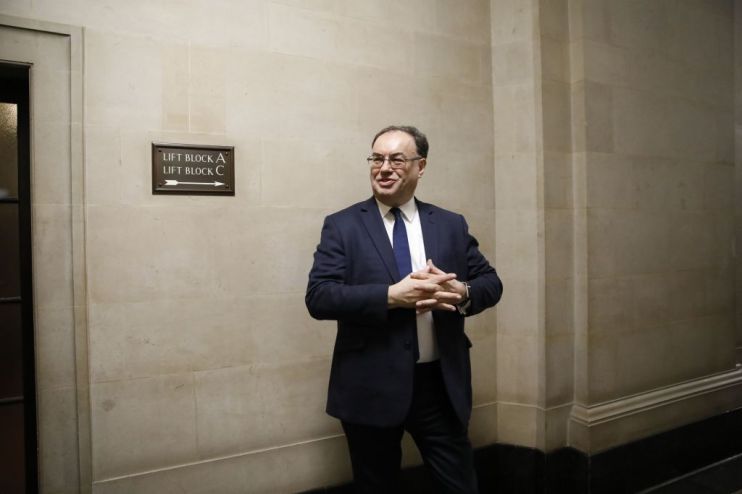FTSE 100 closes lower after BoE boosts stimulus by £100bn

The FTSE 100 closed lower this afternoon following the Bank of England’s announcement that it would expand its quantitative easing programme by £100bn.
London’s blue-chip index finished 0.57 per cent lower at 6,217 points, having opened 0.48 per cent down this morning.
The central bank said it would boost its bond-buying programme by £100bn after a unanimous vote at the BoE’s Monetary Policy Committee (MPC).
It takes the BoE’s total stock of asset purchases to £745bn. However analysts expected a more generous package, which has dragged the FTSE lower.
News of rising cases in the US has also dragged sentiment lower on fears of a second wave. US stocks opened lower across the board with the Dow Jones down 139 points – 0.53 per cent.
The partial lockdown of Beijing is also doing little to quell volatility, as it highlights the risks of easing lockdown measures too early.
Overnight, Japan’s Nikkei lost 0.45 per cent, while the Hang Sang Index dropped 0.37 per cent. The Shanghai Composite inched into the green to close up 0.12 per cent.
European stocks pared some of this morning’s losses with the pan-European Stoxx 600 down 0.51 per cent. Germany’s Dax fell 0.8 per cent while France’s Cac edged down 0.75 per cent.
David Madden, market analyst at CMC Markets, said: “Stocks in Europe are in the red this afternoon as health concerns have chipped away at market confidence.
“Beijing is currently in partial lockdown and its restrictions have become stricter in the past few days. A number of states in the US have seen an increase in the number of Covid-19 cases, most notably Texas – yesterday’s hospitalisation rate jumped by 11 per cent.
“This day last week, equity markets sold-off sharply as traders were terrified at the prospect of a second wave of infections. There has been a rise in cases since then, but dealers are less fearful about the situation spiralling out of control”.
US stocks flat as 1.51m claim unemployment benefits
Wall Street opened lower today following news that a further 1.51m people filed for unemployment benefits last week in the US, taking the total number of claims to 46m.
Midway through trading, however, markets were directionless, trading on or around breakeven.
The Dow Jones was down 71 points – 0.27 per cent, while the S&P 500 is flat. The tech-heavy Nasdaq index edged up 0.1 per cent.
Analysts said that the see-sawing was not uncommon after the sizeable moves of recent days.
Chuck Carlson, chief executive officer at Horizon Investment Services, said: “It’s not unusual after huge moves to trade sidewise. It’s a continuing evaluation of the sustainability of improvement at these rapid levels.”
Despite a staggering figure now claiming for benefits, it marks the 11th week the figure has declined since reaching highs of 6.87m in March. The figure was slightly above analysts’ estimates, despite a slight easing of lockdown measures.
The increase in coronavirus infections in the US is also doing little to calm markets. Ten states have seen record number of cases, with Florida tipped to be the new epicentre of the outbreak.
Twenty-three states are seeing an upward trend in new infections, but President Donald Trump yesterday suggested the virus is “dying out”.
Fed chair Jay Powell said earlier this week that the economy would not recover fully until the virus is brought under control.
All eyes on the Bank of England
Investors have reacted somewhat negatively to the widely anticipated expansion of its asset purchase programme.
Since the coronavirus outbreak, the bank has slashed rates from 0.75 per cent to 0.1 per cent, a 300-year low. It has also added £200bn to its quantitative easing programme to help the economy.
While the announcement was widely expected but some analysts anticipated a bigger package, pulling the FTSE 100 into the red.
“The expansion of the QE programme was a little less than some of us had anticipated, and indeed was really the bare minimum to satisfy the market,” said Neil Wilson, chief market analyst at Markets.com.
“The Old Lady could have been a little bit braver here and expanded the envelope more.”
There had been speculation that the bank could increase the package by £150bn, which would have boosted the FTSE.
Before the Open: Get the jump on the markets with our early morning newsletter
Looming Brexit deadline unnerves FTSE 100
Investors are also looking to Britain’s next pressing isue.
“News that the UK is planning a ‘shock and awe’ campaign to prepare businesses for Brexit reminds investors that the divorce will happen by the end of this year, come hell or high water,” said Ipek Ozkardeskaya, senior analyst at Sqiss Quote.
“In this respect, especially small and medium sized British companies already battered by the Covid-19 pandemic, may suffer additional economic consequences,” she added.
The government will reportedly launch an information campaign to warn the public about the “consequences of not taking action” according to Politico. They will then move to a new phase focusing on avoiding losses due to the disruption.
The Brexit transition period is due to end on 31 December, even if it does not strike a deal with the EU.
The EU leaders are also due to meet today. Currency traders will keep a keen eye on developments, said Charalambos Pissouros, senior market analyst at JFD Group. “We will look for clues as to how far away the EU and the UK are in finding common ground.”
Before the Open newsletter: Start your day with the City View podcast and key market data